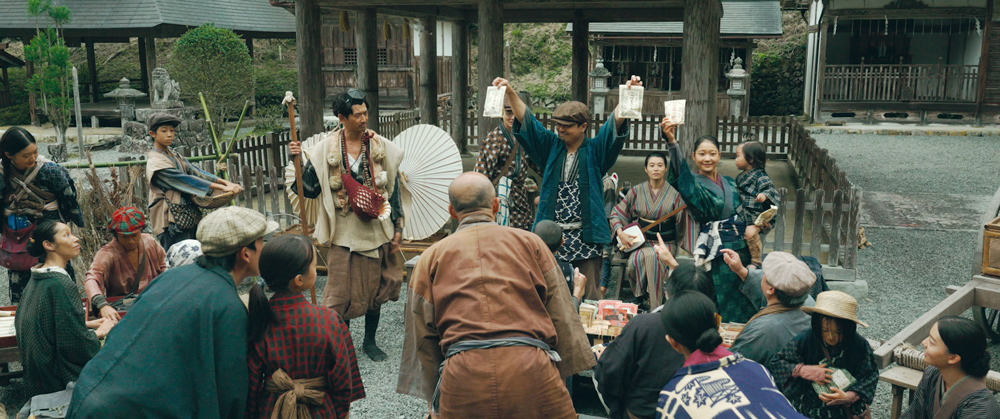!["Fukuda Village Incident" Director Tatsuya Mori A feature film made by a true documentary artist brings out the dark side of Japan [Director's Interview Vol.349]](https://cinemore.jp/images/8de89ac9d1ea36aa8bbebbefce1ea5db6b3d45d02700cc157b9f053841669f14.jpg)
© “Fukuda Village Incident” Project 2023
"Fukuda Village Incident" Director Tatsuya Mori A feature film made by a true documentary artist brings out the dark side of Japan [Director's Interview Vol.349]
Director Tatsuya Mori has produced many masterpiece documentaries such as `` A '' (1997), `` FAKE '' (16), and `` i- The Journalist Document '' (19). This is the first time for this natural-born documentarian to direct a feature-length feature film. Moreover, the subject is the tragedy that occurred during the Great Kanto Earthquake 100 years ago: the massacre of Koreans. This theme has rarely been discussed in Japanese films to date, and has been treated as if it were a taboo. Mori worked together with Haruhiko Arai and other veteran screenwriters to tackle such a sensitive subject and created a stunning feature film. The cast includes some of Japan's most famous actors and personalities, and their enthusiasm will keep the audience's hearts at bay. ``The Fukuda Village Incident'' is A-grade entertainment. How did director Tatsuya Mori create this film? I spoke to him.
“Fukuda Village Incident” synopsis
Behind the hustle and bustle of Taisho democracy, the media, trying to hide the government's mismanagement, stirred up public opinion, saying, "...It must be the work of socialists, Koreans, or rebels," and the anxiety and fear of the citizens gradually increased. Meanwhile, Sawada Tomokazu (Arata Iura), who witnessed a massacre by the Japanese army in Korea, leaves Seoul, under Japanese rule, where Tomokazu was a teacher, with his wife Shizuko (Tanaka Rena), and returns to his hometown of Fukuda village. At the same time, a group of medicine sellers led by Numabe Shinsuke (Nagayama Eita) leaves Sanuki in Shikoku to head to the Kanto region. As if to shatter the peaceful days, an unprecedented earthquake struck the Kanto region on September 1st. Trees fell, houses collapsed, and large fires broke out, killing many innocent people. In the midst of all this, rumors began to spread, and in the blink of an eye, they spread to towns and villages in the Kanto region. On the 2nd, martial law was imposed on Tokyo Prefecture, and on the 3rd it was extended to Kanagawa, and on the 4th it was extended to Chiba, where Fukuda Village is located, and many people fell into chaos. In Fukuda Village, refugees brought information that "Korean people were attacking in groups," and "Koreans were looting and setting fires," and people became suspicious and panicked. Local newspapers tried hard to verify the veracity of the information, but the truth of it was not clear at all. Taking advantage of the confusion after the earthquake, Kameido Police Station was secretly suppressing socialists. Then, on September 6th, coincidence, anxiety, and fear overlapped, and a major incident occurred that would later be buried in history.
Index
- One song led to a movie
- I want to draw the perpetrator anyway.
- Performing a massacre scene
- He also said that he would step down as director.
- I didn't want to say "get ready, start"
- Why hasn't the massacre of Koreans been depicted?
- anyway this is entertainment
One song led to a movie
Q: I heard that ``The Fukuda Village Incident'' was originally brought to a television station as a documentary project, but how did it become a feature film?
Mori: Since it wasn't aired at the time, I wrote it down and included it in my book, `` The world is richer, people are kinder '' (published in 2008). I was relieved for a while, but around the time I filmed `` FAKE ,'' I realized that it was time for me to do a drama, and then I remembered the Fukuda Village Incident.
There wasn't enough material to make a documentary about the Fukuda Village Incident, but I thought it could be made into a feature film, so I wrote a proposal and synopsis and went around to film companies. But this time, it still didn't work. After that, I received an offer from Mitsutsugu Kawamura of Star Sands to direct the feature film `` The Journalist ''. At that time, I was asked if I could also direct a documentary, but I declined because it was physically impossible. But after that, various things happened and I decided to step down from directing feature films, so I made a documentary film, ` `I- The Journalist Document.' '

“Fukuda Village Incident” © “Fukuda Village Incident” Project 2023
Q: After that, Mori-san and screenwriter Haruhiko Arai met, and the project began to move forward.
Mori: In 2019, ` `i - The Journalist Document' ' won first place in the Kinema Junpo cultural film category, and `` Futari no Futari '' (19), directed by Mr. Arai, took first place in the general film category. We were in the same waiting room at the award ceremony, and that's where we met for the first time, and we talked about the Fukuda Village Incident.
Q: I heard that Mr. Arai was also planning to make a movie about the Fukuda Village Incident.
Mori: Mr. Arai had heard Goro Nakagawa's song `` 1923 Fukuda Village Massacre '' a year or two before that and wanted to make it into a movie. So how did Goro Nakagawa find out about the incident? He read my book, `` The world is richer, and people are more kind .'' So I feel like I've come back after a full circle.
Q: It feels a bit like fate.
Mori: I wonder if it's a coincidence or necessity.
I want to draw the perpetrator anyway.

